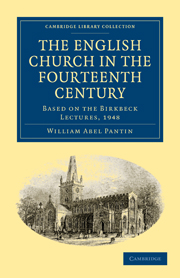Book contents
- Frontmatter
- Contents
- Preface
- List of Abbreviations
- I INTRODUCTION: THE LEGACY OF THE THIRTEENTH CENTURY
- PART I CHURCH AND STATE
- PART II INTELLECTUAL LIFE AND CONTROVERSY
- VI SCHOLASTIC INSTITUTIONS AND THE GEOGRAPHY OF LEARNING
- VII TOPICS OF CONTROVERSY
- VIII PERSONALITIES
- PART III RELIGIOUS LITERATURE
- Appendix I The Latin text of passages quoted from manuscript sources
- Appendix II Two collections of didactic treatises
- Index
VII - TOPICS OF CONTROVERSY
Published online by Cambridge University Press: 10 November 2010
- Frontmatter
- Contents
- Preface
- List of Abbreviations
- I INTRODUCTION: THE LEGACY OF THE THIRTEENTH CENTURY
- PART I CHURCH AND STATE
- PART II INTELLECTUAL LIFE AND CONTROVERSY
- VI SCHOLASTIC INSTITUTIONS AND THE GEOGRAPHY OF LEARNING
- VII TOPICS OF CONTROVERSY
- VIII PERSONALITIES
- PART III RELIGIOUS LITERATURE
- Appendix I The Latin text of passages quoted from manuscript sources
- Appendix II Two collections of didactic treatises
- Index
Summary
It cannot be too much stressed that the fourteenth century was throughout an age of continuous controversies, that there was a close connexion between theology and politics, and that we can only understand such a thing as the Wycliffite controversy, for instance, by considering it as one episode, admittedly the most extreme, in a long series of controversies. It may be useful therefore to attempt to analyse or list the various ingredients of controversy during this period. Here, as in other respects, the fourteenth century was very much a development of the thirteenth; many of the topics had their origin in the previous age.
The controversy about Apostolic Poverty goes back to the thirteenth century and especially to the attacks upon the mendicants by William of St Amour and Gerard of Abbeville and their defence by St Thomas Aquinas, St Bonaventure and John Pecham. The controversy took two forms. On the one hand there was the internal split among the Franciscans, between the Conventuals and the Spirituals, over the interpretation of the Franciscan ideal of poverty. On the other hand there was the external war between the rival claims of the mendicants, that is, those religious who lived by begging alms, and the possessioners, that is, those religious who lived on their endowments. Could it be said that one of these two represented the more perfect, the more expedient, or even the only lawful form of life?
- Type
- Chapter
- Information
- The English Church in the Fourteenth CenturyBased on the Birkbeck Lectures, 1948, pp. 123 - 135Publisher: Cambridge University PressPrint publication year: 2010First published in: 1955

